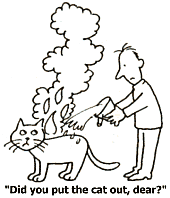IEC. Oct. 24/5th
Picture: 1. to put out: to take a pet [dog,cat] out in the backyard to play or go to the toilet;
 2. to put out: to extinguish (fire). E.g. a) Put out that cigarette. You can't smoke in here. b) The campers put out the camp fire before going to sleep in their tents.
2. to put out: to extinguish (fire). E.g. a) Put out that cigarette. You can't smoke in here. b) The campers put out the camp fire before going to sleep in their tents.What is a gerund?
Every gerund, without exception, ends in -ing.
Gerunds are not, however, all that easy to pick out. The problem is that all present participles also end in -ing. What is the difference?
Gerunds function as nouns. Thus, gerunds will be subjects, subject complements, direct objects, indirect objects, and objects of prepositions. Present participles complete progressive verbs or act as modifiers. Read these examples:
Since Francisco was five years old, swimming has been his passion.
Swimming = subject of the verb has been
Francisco's first love is swimming.
Swimming = subject complement of the verb is
Francisco enjoys swimming more than spending time with his girlfriend Diana.
Swimming = direct object of the verb enjoys
Francisco gives swimming all of his energy and time.
Swimming = indirect object of the verb gives
When Franciso wore dive fins to class, everyone knew that he was devoted to swimming.
Swimming = object of the preposition to
One day last summer, Francisco and his coach were swimming at Daytona Beach.
Swimming = present participle completing the past progressive verb were swimming
A great white shark ate Franciso's swimming coach.
Swimming = present participle modifying coach
Now Francisco practices his sport in safe swimming pools.
Swimming = present participle modifying pools
Infinitives
An infinitive is a verbal consisting of the word to plus a verb (in its simplest "stem" form).
Be sure not to confuse an infinitive--a verbal consisting of to plus a verb--with a prepositional phrase beginning with to, which consists of to plus a noun or pronoun and any modifiers.
Infinitives: to fly, to draw, to become, to enter, to stand, to catch, to belong
Prepositional Phrases: to him, to the committee, to my house, to the mountains, to us, to this address.
A very detailed explanation of gerunds, participles and infinitives is found on the following link:
http://owl.english.purdue.edu/handouts/grammar/g_verbals.html
Phrasal Verbs
You need to learn only the phrasal verbs mentioned in the class. The verbs listed in the links I provide below are for your information and self-study only.
Phrasal verbs are one of the most difficult vocabulary to learn. They just need to be learned - there's no rule that can help you figure out the meaning. If you're interested, check out the following link that gives you a long list of phrasal verbs and their meanings:
http://www.eslcafe.com/pv/pv-mng.html
Also:
http://www.englishpage.com/prepositions/phrasaldictionary.html


0 Comments:
Post a Comment
<< Home